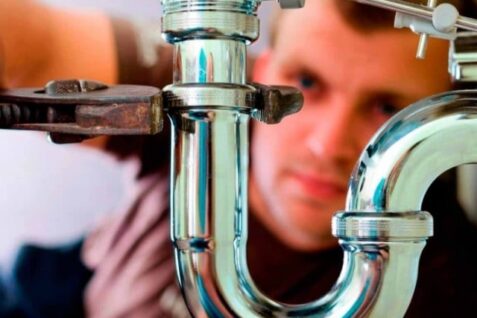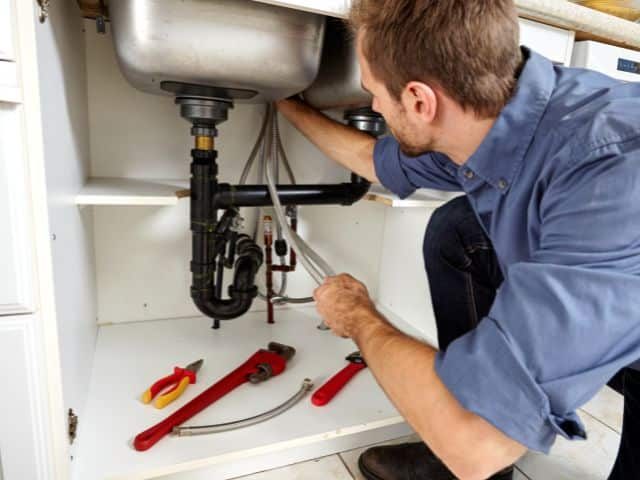
Plumbing in Preventing Water Damage in Your Home
Water damage is one of the most significant threats to the structural integrity and livability of a home. From minor leaks that gradually erode surfaces to catastrophic pipe bursts that flood …
Water damage is one of the most significant threats to the structural integrity and livability of a home. From minor leaks that gradually erode surfaces to catastrophic pipe bursts that flood entire rooms, water can wreak havoc if not properly managed. One of the most crucial defenses against water damage is a well-maintained plumbing system. By understanding the role plumbing plays in preventing water damage, homeowners can take proactive steps to safeguard their property and peace of mind.
Understanding Water Damage and Its Consequences
Water damage occurs when excess water infiltrates areas of a home where it doesn’t belong. This can stem from various sources, including natural disasters, broken pipes, malfunctioning appliances, or poorly maintained plumbing systems. The consequences of water damage are both immediate and long-term, ranging from aesthetic issues like discoloration and peeling paint to severe structural problems such as mold growth, wood rot, and weakened foundations.
Beyond structural concerns, water damage can also impact health. Mold and mildew thrive in damp environments, leading to respiratory issues, allergies, and other health complications for residents. Furthermore, water-related repairs can be costly, making prevention far more economical than remediation. For expert advice and tips on how to prevent water damage in your home, visit abacusplumbing.com/plumbing/.
The Plumbing System: Your Home’s First Line of Defense
A home’s plumbing system comprises pipes, valves, fixtures, and appliances designed to transport water efficiently and safely. When functioning correctly, this system ensures that clean water is delivered where needed, and wastewater is removed effectively. However, any malfunction within this system can lead to leaks, overflows, or even flooding, emphasizing the importance of routine maintenance.
Key Plumbing Components and Their Role in Preventing Water Damage
- Pipes and Fittings Pipes are the arteries of your plumbing system. They transport water throughout your home, making their integrity critical. Corroded, cracked, or poorly installed pipes are common culprits of leaks. Regular inspections and timely replacements can help prevent water seepage and subsequent damage.
- Valves Valves regulate water flow and pressure within the plumbing system. Faulty valves can cause uncontrolled water release, leading to significant damage. Shut-off valves, in particular, are essential during emergencies, allowing homeowners to stop water flow quickly in the event of a leak or burst pipe.
- Fixtures and Appliances Fixtures such as faucets, showerheads, and toilets, as well as appliances like washing machines and dishwashers, are common sources of leaks. Regular maintenance, including checking for drips or loose connections, can mitigate risks. Upgrading to water-efficient fixtures can also reduce strain on the system.
- Drains and Gutters Proper drainage is vital for preventing water accumulation. Clogged drains can cause water to back up, potentially flooding sinks, showers, or basements. Similarly, gutters and downspouts should be kept clear to direct rainwater away from your home’s foundation.
Proactive Plumbing Practices for Water Damage Prevention
To minimize the risk of water damage, homeowners should adopt a proactive approach to plumbing maintenance. Here are several strategies to keep your system in top shape:
- Conduct Regular Inspections Schedule routine inspections with a licensed plumber to identify and address potential issues before they escalate. Professional plumbers can detect hidden leaks, assess pipe conditions, and recommend necessary repairs or replacements.
- Monitor Water Pressure Excessively high water pressure can strain pipes and fixtures, increasing the likelihood of leaks or bursts. Invest in a water pressure gauge to monitor levels and install a pressure regulator if needed.
- Inspect Appliances Regularly check appliances connected to your plumbing system, such as water heaters, washing machines, and refrigerators with water dispensers. Look for signs of wear, rust, or leaks and replace damaged components promptly.
- Clear Drains and Gutters Prevent clogs by cleaning drains and gutters regularly. Avoid pouring grease, food particles, or other debris down the drain. Use strainers to catch hair and other materials that could lead to blockages.
- Install Leak Detection Systems Modern leak detection systems can alert homeowners to leaks or abnormal water usage. These devices can be particularly useful for early intervention, preventing minor issues from becoming costly disasters.
- Insulate Pipes In colder climates, frozen pipes are a significant concern. Insulate exposed pipes to prevent freezing, which can cause them to burst. During extreme cold, allow faucets to drip slightly to keep water moving through the system.

Signs of Plumbing Issues to Watch For
Being vigilant about early warning signs can help prevent water damage. Common indicators of plumbing problems include:
- Unexplained increases in water bills, suggesting a hidden leak.
- Discolored or damp spots on walls, ceilings, or floors.
- Mold or mildew growth in unexpected areas.
- Persistent odors of dampness or sewage.
- Slow-draining sinks, tubs, or showers.
Addressing these signs promptly can prevent more extensive damage and costly repairs.
The Importance of Professional Help
While some maintenance tasks can be handled by homeowners, complex plumbing issues should always be entrusted to professionals. Licensed plumbers have the expertise and tools to diagnose and repair problems accurately, ensuring the longevity of your plumbing system.
Attempting DIY fixes without proper knowledge can exacerbate issues, leading to more significant damage. Investing in professional services not only protects your home but also provides peace of mind knowing the job is done correctly.
Plumbing Upgrades for Long-Term Protection
For older homes or those with outdated plumbing systems, upgrades can be a wise investment. Modern materials like PEX or PVC pipes offer greater durability compared to traditional metal pipes. Additionally, installing smart plumbing systems with automated water shut-off valves and real-time monitoring can enhance protection against leaks and water damage.
Water-efficient fixtures and appliances not only reduce water bills but also lessen the strain on your plumbing system, contributing to its longevity. Consult a plumbing professional to determine the best upgrades for your home’s needs.
Conclusion
Plumbing plays an indispensable role in preventing water damage, safeguarding your home’s structure, and protecting its inhabitants’ health. By understanding the critical components of your plumbing system and implementing proactive maintenance practices, you can minimize the risk of water-related issues.
Regular inspections, early intervention, and professional assistance are key to ensuring a reliable and efficient plumbing system. Moreover, investing in modern upgrades can provide long-term protection, enhancing your home’s resilience against water damage.
Taking the time to care for your plumbing system not only saves money but also ensures the safety and comfort of your living space. After all, a well-maintained plumbing system is the foundation of a dry, healthy, and happy home.





